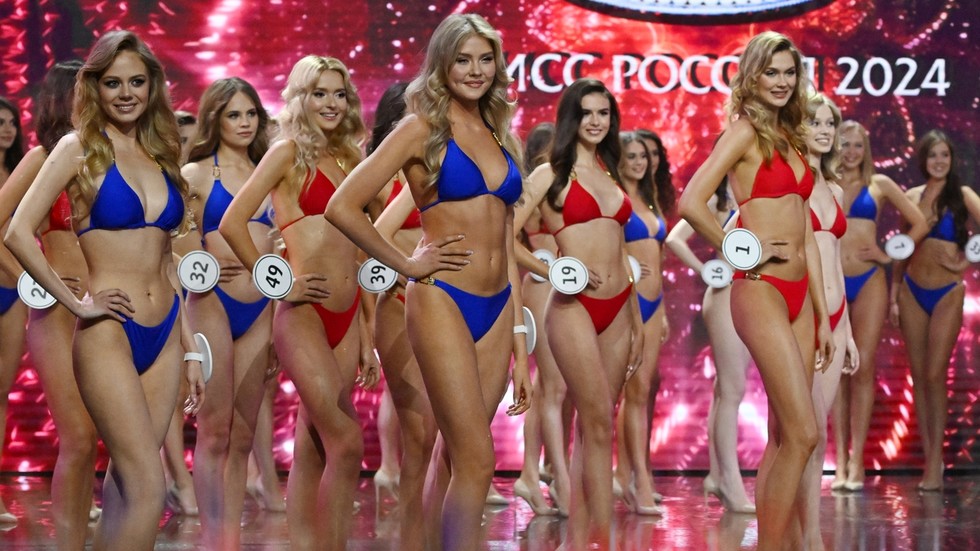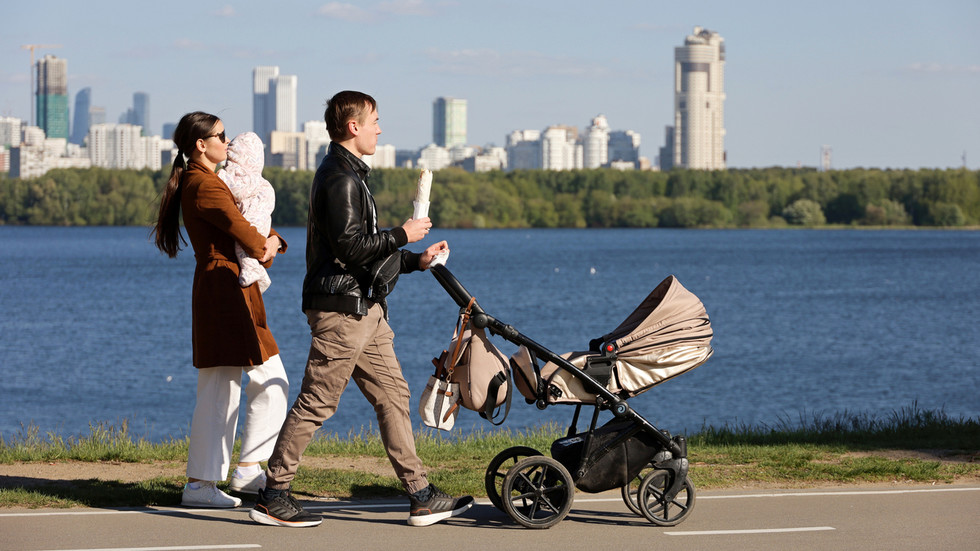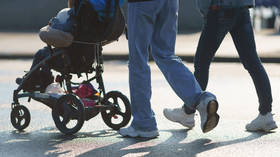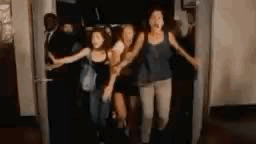You are using an out of date browser. It may not display this or other websites correctly.
You should upgrade or use an alternative browser.
You should upgrade or use an alternative browser.
Russia Culture General
- Thread starter Husky
- Start date

Beauty pageant crowns Miss Russia 2024 (PHOTOS)
An 18-year-old from the Republic of Chuvashia took this year’s Miss Russia title, beating 49 other contestants from across the country
I read the link you posted and here is what was said at the bottom of the page "This year, over 85,000 young women applied to participate in the pageant, which has been held since 1993. According to the rules, only unmarried and childless Russian women between the ages of 18 to 23 are eligible to compete."
Beauty pageant crowns Miss Russia 2024 (PHOTOS)
An 18-year-old from the Republic of Chuvashia took this year’s Miss Russia title, beating 49 other contestants from across the countrywww.rt.com
It sounds extremely based.

Kremlin pours cold water on proposed ‘tax on childlessness’
A tax on childlessness is unlikely to solve Russia’s demographic problems, Kremlin spokesman Dmitry Peskov has said
Russia needs to create an incentives based system for dealing with childless couples and even singles. Hungary has had great success with this.
Kremlin pours cold water on proposed ‘tax on childlessness’
RT3-4 minutesThe measure has been widely debated by Russian MPs amid efforts to boost the birth rate in the country
A tax on childlessness is unlikely to solve Russia’s demographic problems, according to Kremlin spokesman Dmitry Peskov. The country has been plagued by a declining birth rate for years. In 2023, only 1.264 million children were born in Russia, the lowest since 1999, according to Rosstat.
The proposed tax entered the spotlight earlier this month, after Lieutenant General Andrey Gurulev, a member of the State Duma Defense Committee, suggested reviving the Soviet-era policy of taxing people who don’t have children, arguing that the money raised could be used to modernize orphanages.
Speaking to reporters on Monday, Peskov said the Kremlin does not yet know the specific details of the proposal, which makes it difficult to form an opinion on it.
“It is important to know the details of the proposal, we don’t yet know what it involves,” he stated, adding that lawmakers should take time to analyze the Soviet efforts on the policy first before rushing through legislation.

“We need to analyze that experience. At first glance, this tax had hardly any impact on the demographic situation. Although this matter should first be studied by experts,” Peskov said.
The tax was introduced in the USSR to stimulate population growth after the country suffered huge losses in World War II. It was in effect from 1941 to 1992 and applied to men aged 20-50 and married women aged 20-45 who did not have children. The tax rate varied around 6%, depending on income.
The idea of reviving the tax has sparked heated debate among lawmakers. Russian State Duma MP Evgeny Popov said earlier this month that the country should instead introduce a “tax on stupidity.”
Nina Ostanina, the head of the State Duma Committee on Family Protection, warned that the measure could “traumatize” young Russians, arguing that many people put off having children for financial reasons. Some MPs noted that there are medical issues that can prevent people from having children, while others argued that providing housing, good wages, and social guarantees to young families is a better way to boost the birth rate.
Commenting on Gurulev’s proposal, State Duma Chair Vyacheslav Volodin urged lawmakers to “avoid ill-considered initiatives and extremes,” so as not to “frighten people.” He stressed that no one will violate the right of women to choose whether or not to have children.
Russia has lotteries, doesn't it? Lotteries are essentially this, or at least a tax on people who are bad at math.The tax was introduced in the USSR to stimulate population growth after the country suffered huge losses in World War II. It was in effect from 1941 to 1992 and applied to men aged 20-50 and married women aged 20-45 who did not have children. The tax rate varied around 6%, depending on income.
The idea of reviving the tax has sparked heated debate among lawmakers. Russian State Duma MP Evgeny Popov said earlier this month that the country should instead introduce a “tax on stupidity.”
www.rt.com /russia/607923-lgbt-attitudes-levada-poll/
Some 44% of those surveyed said that they view gays and lesbians with “disgust and fear”
More than a half of Russians hold a negative opinion on LGBT people, a poll by the Levada Center has revealed.
The survey, the results of which were published on Monday, took place between October 24 and 30 and involved 1,617 people from 137 cities, towns and villages across Russia.
"Negative attitudes towards LGBT people in Russia are growing,” the Levada Center, which is listed as a foreign agent in the country, said on its website.
According to the study, 44% of respondents view gays and lesbians with “disgust and fear,” another 15% are irritated by them, and are 10% wary of such people.
Some 26% described their attitude on the issue as calm and non-emotional. Those with positive feelings about the LGBT community comprised only 1%, while 0% said they were interested in sexual minorities, the poll found.
The number of respondents expressing disgust or fear over sexual minorities is 17% higher than a similar study from 2013, when the figure was 27%, the Levada Center noted.
Over the last five years, the proportion of Russians who do not agree with the notion that gays and lesbians should enjoy the same rights as other citizens has been steadily growing, currently totalling 62%, according to the study.
Almost two thirds of respondents (62%) told the Levada Center that they were concerned that their children or grandchildren could become victims of gay propaganda.
More than a half of those surveyed (59%) said that they would communicate less or stop communicating altogether with their acquaintances if they found out they were homosexual, the study said.
According to the poll, a tenth of respondents confirmed that they know somebody who is gay or lesbian.
A ban on disseminating LGBTQ material among those aged under 18 was introduced in Russia in 2013. In 2022, the legislation was expanded to include both minors and adults.
Last year, Russia’s Supreme Court outlawed the “international LGBT public movement,” designating it an extremist organization.
Russian President Vladimir Putin previously clarified that the authorities do not have any issues with what members of the gay community do in their personal lives, as long as they “don’t flaunt it” in public and do not involve children.
Poll shows Russians’ changing attitudes to LGBT
RT3-3 minutesSome 44% of those surveyed said that they view gays and lesbians with “disgust and fear”
More than a half of Russians hold a negative opinion on LGBT people, a poll by the Levada Center has revealed.
The survey, the results of which were published on Monday, took place between October 24 and 30 and involved 1,617 people from 137 cities, towns and villages across Russia.
"Negative attitudes towards LGBT people in Russia are growing,” the Levada Center, which is listed as a foreign agent in the country, said on its website.
According to the study, 44% of respondents view gays and lesbians with “disgust and fear,” another 15% are irritated by them, and are 10% wary of such people.
Some 26% described their attitude on the issue as calm and non-emotional. Those with positive feelings about the LGBT community comprised only 1%, while 0% said they were interested in sexual minorities, the poll found.
The number of respondents expressing disgust or fear over sexual minorities is 17% higher than a similar study from 2013, when the figure was 27%, the Levada Center noted.
Over the last five years, the proportion of Russians who do not agree with the notion that gays and lesbians should enjoy the same rights as other citizens has been steadily growing, currently totalling 62%, according to the study.
Almost two thirds of respondents (62%) told the Levada Center that they were concerned that their children or grandchildren could become victims of gay propaganda.
More than a half of those surveyed (59%) said that they would communicate less or stop communicating altogether with their acquaintances if they found out they were homosexual, the study said.
According to the poll, a tenth of respondents confirmed that they know somebody who is gay or lesbian.
A ban on disseminating LGBTQ material among those aged under 18 was introduced in Russia in 2013. In 2022, the legislation was expanded to include both minors and adults.
Last year, Russia’s Supreme Court outlawed the “international LGBT public movement,” designating it an extremist organization.
Russian President Vladimir Putin previously clarified that the authorities do not have any issues with what members of the gay community do in their personal lives, as long as they “don’t flaunt it” in public and do not involve children.
That looks like ham salad with peas and corn, which sounds pretty good.
I just spent two weeks in Saint Petersburg - it was magical!
Is it true that Russian cities are cleaner and nicer than European and American cities? Were you always in the downtown area or did you get a chance to see the neighborhoods where average people live? Did you get a chance to visit any other 2nd or 3rd tier cities to see what they look like?I just spent two weeks in Saint Petersburg - it was magical!
Also, I've heard that while Putin seems to promote Christianity in some ways, the culture is still generally non-religious, and a huge portion of the population is dysfunctional, with low life expectancy, high level of alcoholism, high numbers of abortions, and many other similar spiritual and behavioral problems. What were your impressions from being there in person?
Is it true that Russian cities are cleaner and nicer than European and American cities? Were you always in the downtown area or did you get a chance to see the neighborhoods where average people live? Did you get a chance to visit any other 2nd or 3rd tier cities to see what they look like?
Also, I've heard that while Putin seems to promote Christianity in some ways, the culture is still generally non-religious, and a huge portion of the population is dysfunctional, with low life expectancy, high level of alcoholism, high numbers of abortions, and many other similar spiritual and behavioral problems. What were your impressions from being there in person?
You heard wrong, and your views seem to be skewed by Gell-Mann amnesia. I was all over Petersburg and let me assure you that it is a wonderful, clean, and orderly city no matter where you go. Everyone seemed in a very festive mood and all I saw were families and friends enjoying a great time together in peace and without the distractions of all the chaos and incessant brain washing we have come to accept as reality in the West. Frankly speaking I have not felt such a sense of tranquility and peace for a very long time now and cannot wait to go back this spring. By the way, I had the good fortune to attend an orthodox mass in the Kazan cathedral. It was an unforgettable experience
I've heard both sides of things, and there's no way for me to know first hand. However, I trust your report, so I'm glad to hear things are so good there.You heard wrong, and your views seem to be skewed by Gell-Mann amnesia. I was all over Petersburg and let me assure you that it is a wonderful, clean, and orderly city no matter where you go. Everyone seemed in a very festive mood and all I saw were families and friends enjoying a great time together in peace and without the distractions of all the chaos and incessant brain washing we have come to accept as reality in the West. Frankly speaking I have not felt such a sense of tranquility and peace for a very long time now and cannot wait to go back this spring. By the way, I had the good fortune to attend an orthodox mass in the Kazan cathedral. It was an unforgettable experience
That looks like ham salad with peas and corn, which sounds pretty good.
It's a veggie salad called "Olivier".
It's not a uniquely Russian dish, as all countries in the region have their own variation. I came to know (and like) it as a Polish dish.

Olivier salad - Wikipedia
In Bulgaria this is literally called Руска Салата, aka "Russian Salad". I was always under the impression that it originates from Russia.It's a veggie salad called "Olivier".
It's not a uniquely Russian dish, as all countries in the region have their own variation. I came to know (and like) it as a Polish dish.
The joke in these images is about the sheer amount they usually make.
Olivier salad - Wikipedia
en.wikipedia.org
And yes, it is a greasy dish served in large quantities that is very easy to overconsume, hence the meme.
Could it be that you were both right? Seeing some happy people and a clean environment does not preclude the possibility of these spiritual and social problems from being widespread. Japan is an atheist country full of workaholics and it's very clean and peaceful. But you wouldn't know the problems they have just by observing them in the street.I've heard both sides of things, and there's no way for me to know first hand. However, I trust your report, so I'm glad to hear things are so good there.
I will say though, when you have the case like in America where these problems are blatantly obvious in the middle of our biggest cities, that does not bode well for the country.
I'm also curious to know what it's like outside of the wealthy Moscow and St Petersburg. I've heard it's a different world there.





